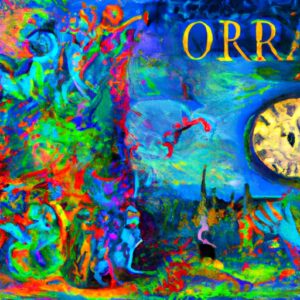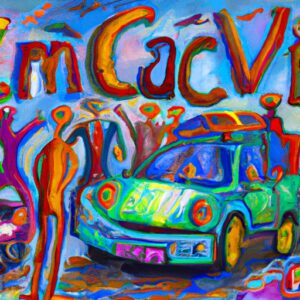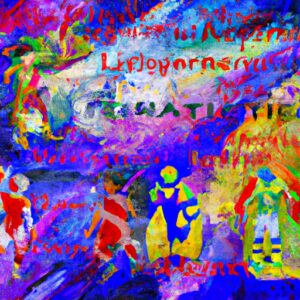Embark on a hilarious exploration of “The Funniest Italian Words.”
From comical phrases to peculiar expressions, join us on a linguistic adventure that will tickle your funny bone.
Get ready for laughter as we delve into Italy’s comedic charm.
The Funniest Italian Words: A Hilarious Linguistic Journey
Italian is a melodic and expressive language full of amusing words.
From “impacciato“ to “sgattaiolando,” it offers a treasure trove of expressions.
Each word holds deep meaning and adds flavor to the emotions Italians express.
Explore “babbeo,” meaning silly, and “scappellotto,” a light tap on the head. It’s fascinating to learn the Italian dialect.
Many of these funny words don’t have exact translations in English.
Familiarizing yourself with basic words and meanings can make your experience of learning much more interesting. Incorporate these expressions into your vocabulary to understand and connect better with native speakers. Add extra entertainment to conversations! Take advantage of online resources. Make it your goal to become fluent. Don’t miss out on all the fun – start learning today! Sprezzatura: pretend you didn’t try – that’s the most Italian thing to do!
Top 10 Funniest Italian Words and Expressions
To explore the top 10 funniest Italian words and expressions, you need to master the art of Italian humor.
“Pasta al dente,” “Cavoli a merenda,” “Prezzemolo,” “Frittata,” “Piove a catinelle,” “Tirare il pacco,” “La gallina vecchia fa buon brodo,” “Non ho capito un cavolo,” “Meno male,” and “Essere al verde” are the sub-sections of this section.
Each of these expressions has a unique twist that will leave you in fits of laughter.
“Pasta al dente”
Achieving ‘perfect pasta’ is an art in Italian cuisine. A phrase used to describe the preparation of pasta is when it is cooked just right – ‘Firmi al dente’.
This literally means “to the tooth”. It implies that the pasta should have a slight resistance when you bite it. It should be firm yet tender.
Italians take their pasta seriously. A good plate of pasta starts with how you cook the noodles. Every strand needs to hold its shape and have a bite without any starchy aftertaste.
So, ‘Firmi al dente’ has been adopted as the standard way to prepare pasta in Italy.
This technique also makes sure all the flavors and oils from the sauce cling to the pasta.
Too much boiling, and you get watery noodles. Too little heat, and it tastes like raw dough! So, when in doubt, remember – Firmi al dente!
I experienced this phrase during a trip to Florence. I ordered a plate of cacio e pepe from a roadside deli.
The server emphasized ‘Firmi al dente’ before walking away. Later when I tasted the dish, I understood why he said this phrase!
When life gives you cavoli a merenda, make sure you have enough wine to wash them down.
“Cavoli a merenda.”
In Italy, “cavoli a merenda“ is a weird phrase. It means having an unreasonable plan. It can be translated as “cabbage for a snack”. This symbolizes a peculiar mix of food items.
Another funny Italian phrase is “Avere le brisketelle!” It means being very idle. It literally means “having the eels”, referring to their sluggish movements.
“Fare il ponte“ is used for taking a long weekend break. Friday and Monday are off. This phrase means “making a bridge”.
Prezzemolo? Not a swear word. Just parsley!
“Prezzemolo”
This Italian word is a must-have in Italian dishes. It’s a herb that’s become so popular they use it to describe people who ‘pop up’ in lots of situations.
It’s slang for someone who shows up often or unexpectedly.
Don’t cry over a broken frittata! Make a new one! A happy accident!
“Frittata”
Italian Cuisine is packed with tasty dishes and vibrant expressions. Of these all, the “Bad Omelet” is the most intriguing.
Known in Italy as Frittata, this egg-based dish has gained fame as a comforting food to be enjoyed any time of day.
It’s an omelet-like dish, named after the Italian word “friggere,” which means to fry. It’s often cooked with cheese, veggies, or leftovers.
Frittata hails from rural Italy, when farmers needed a way to cook their eggs and veggie scraps.
It can be served either hot or cold for breakfast, lunch, or dinner. Plus, it’s ideal for a quick snack on the go.
If you’re looking to show off your cooking prowess, try adding Frittata to your repertoire. Eggs go with any topping of your choice. Leftover veggies or meat make it even tastier.
And one last thing – Frittata doesn’t require much attention while cooking, so whip it up whenever unexpected guests arrive!
So why not give it a try? When it rains, it pours…Frittata is just too delicious for the Italians!
“Piove a catinelle”
When it rains heavily, Italians say, “It’s raining buckets.” But if the intensity increases, they use a wittier phrase:
“It’s raining basins,” or in Italian, “Piove a catinelle.” This means intense and persistent rainfall that floods streets like a bunch of basins full of water pouring from the sky. It’s often used when there’s a sudden downpour.
The Italian language has many interesting expressions and words like “fare pucci pucci,” which means snuggling or talking to pets in a baby voice, and “cavoli a merenda,” which means having cabbage for a snack.
These expressions can be amusing due to their literal meanings, which may sound odd in other languages, showing cultural subtleties.
Every Italian phrase carries its own story and meaning beyond what it appears to mean. Each word creates a vivid image, thanks to the narrative elements of Italian culture.
These entertaining expressions are great conversation starters when visiting Italy. The locals will appreciate your efforts to learn their language.
To have a great time interacting with Italians and understand jokes on social media and TV shows, it’s wise to learn some Italian slang expressions beforehand.
Otherwise, you may miss chances to bond with people from different backgrounds and experience local customs. Just be careful not to give someone ‘il pacco‘ – it might be ticking!
“Tirare il pacco”
‘Tirare il pacco’ is an Italian phrase meaning to abruptly cancel a commitment with no warning. It expresses someone not delivering on their promises and causes annoyance.
Another humorous expression is ‘cocco di mamma’ – ‘mom’s pet’. This is used for someone who is overly pampered and spoiled.
An interesting Italian word without an English translation is ‘magari’. It conveys the desire for something that may be impossible yet still offers hope.
Italians also use exaggerated words like ‘smorto’ – bored out of your mind – or ‘pantofolaio’ – someone who prefers staying inside.
Adjectives like ‘scrocchiarella’ are reserved for describing something delicious but too rich and creamy. In English, we just say ‘um’, ‘ah’, or ‘mm’.
Scientific research shows laughter releases endorphins and boosts the mood. So, next time you’re with Italian locals, include some funny expressions and watch the smiles!
“La gallina vecchia fa buon brodo”
Italian is renowned for its expressive language! A popular proverb is “The old hen makes good broth” – it means older people make better decisions due to their life experiences. It’s just like a stew – the longer it simmers, the richer it gets!
Plus, Italian has other fascinating expressions. “Paparino“ is a term for someone who acts like a religious figure. “Prendere lucciole per lanterne“ means mistaking something for what it’s not.
Slang also exists in Italian. “Fare bella figura“ means making a good impression – and not only in social situations. It also suggests striving for excellence in everyday life.
Many other fun words exist, such as “boh“ which means ‘I don’t know’. You have to be wary, though – context and tone change the meanings of expressions.
Next time you’re in Italy, try using some of these words! It’ll let you learn new ways of expressing yourself and maybe make some new friends too!
And if you don’t understand, just remember ‘non ho capito un cavolo‘ – ‘I didn’t understand a damn thing’ unless you love cabbage!
“Non ho capito un cavolo”
“Meno male” is a popular Italian expression that means “I didn’t understand a damn thing”.
It’s used in informal settings but not in formal ones. The word “cavolo” in the phrase translates to cabbage. This likely came from replacing stronger language with less offensive terms.
Funny Italian expressions include “fare il diavolo a quattro” (make mischief) and “essere al verde” (being broke). These idioms show the unique character of the Italian language.
Italian culture is full of amusing anecdotes and legends. One such story involves Gioachino Rossini.
When asked to imitate the sound of a frying egg, he waved his baton and shouted, “Fry slowly! Fry quickly!” – impressing everyone with his wit and music.
Finally, “Meno male“ is a way of saying Phew, I’m glad I narrowly avoided eating an entire pizza by myself!
“Meno male”
“Meno male!” That’s the Italian way of expressing relief or gratitude.
It’s like saying, “Thank goodness!” or “That’s a relief!” For example, if you almost missed your train but caught it last minute, you can shout this out.
There’s more fun in the Italian language than just romantic and poetic words. “Non vedo l’ora” is an amusing phrase that translates to “I can’t see the hour.” It’s used when someone is eagerly awaiting an event or activity.
Adding some comedy to your Italian vocabulary? Try “fagiolo” (bean, but actually means someone who is boring), “magari” (ironically used to mean the opposite of what is said) and “cavoli!” (for disappointment or frustration).
If you want to impress an Italian friend with your language skills, why not include some funny phrases here and there? Enjoy the laughs and cultural connections that come with mastering these colloquialisms!
“Essere al verde”
In Italy, being broke is referred to as “Essere al verde”. This phrase translates to “being in the green” and ironically means that you are out of money.
Italians also use this phrase to describe sticky, unpleasant situations with no way out.
To avoid this, travelers must plan ahead and budget carefully when visiting Italy.
Humorous expressions in the Italian language can be confusing for non-natives.
For example, “prendere fischi per fiaschi” means “to take whistles for flasks”, implying mistaken assumptions.
And the phrase “prendere la luna con il naso” literally translates to “to take the moon with one’s nose”, indicating extreme gullibility.
Italian humor is based on puns and lexical ambiguity. Jokes often rely on multiple meanings of words or implications across different contexts.
Thus, understanding them can be a linguistic challenge for non-native speakers.
Pro tip: Before visiting Italy, learn some basic Italian vocabulary. You’ll be able to communicate more effectively and understand Italian jokes and conversations better.
Get ready to laugh your pasta off with these other hilarious Italian words and phrases!
Other Hilarious Italian Words and Sayings
To explore more hilarious Italian words and sayings, dive into “Other Hilarious Italian Words and Sayings” in “The Funniest Italian Words” article.
“Basta la pasta,” “Facciamo la scarpetta,” “Avere le braccine corte,” “Avere le mani bucate,” “Essere un pezzo di pane” are the sub-sections that will have you laughing out loud.
“Basta la pasta”
“Basta la pasta” is a famous Italian saying meaning “Enough with the pasta“.
It has been passed down through generations and reflects the importance of pasta in Italian culture.
But it’s not just about food – it’s used to end any discussion on a positive or negative note.
Plus, when accompanied by a specific hand gesture, it becomes more emphatic.
When speaking to non-Italian speakers, be careful, as “Basta la pasta“ can be misinterpreted. Want to have fun in Italian? Learn these everyday idioms!
Fancy a laugh? It’s “facciamo la scarpetta” for a leftover sauce with bread – the “shoe game”!
“Facciamo la scarpetta”
In Italian culture, “facciamo la scarpetta“ is the act of using bread to soak up the sauce from a plate.
This tradition of savoring every bit of the meal is part of Italian cuisine. It also shows respect for the ingredients.
Another funny Italian saying is “Non avere peli sulla lingua,” which translates to “not having hairs on your tongue”.
It means to speak plainly and honestly. Italians use exaggerated expressions too. For example, “alla faccia di tutti“ means “in everyone’s face”.
Idioms in Italy vary from region to region. For example, “scarpe strette e culi larghi“ means “tight shoes and wide butts”. This reflects how people want comfort but still buy too-small shoes.
The Italian language is very important to Italian culture. It has inspired many other cultures.
The Local Italy news reported an increase in Italian language learners during COVID-19 lockdowns.
“Why bother with stars when you can’t even reach the top shelf? Avere le braccine corte, the struggle is real.”
“Avere le braccine corte”
When someone says “avere le braccine corte” in Italian, it means they have a limited reach or can’t stretch far.
This humorous phrase is used to excuse oneself from doing something. It could be a physical limitation or figuratively mean someone lacks resources or ability.
This phrase is amusing when confronting tough situations. Don’t take yourself too seriously; use it for a laugh!
Italian vocabulary is varied and distinct, with idiom-filled conversations. For example, “far l’orecchio fino” means to listen carefully with great attention.
Remember these sayings when chatting with Italian friends or colleagues.
You’ll sound much more fluent! Also, “avere le mani bucate” is the Italian way of accidentally reaching into someone else’s pocket – not pickpocketing.
“Avere le mani bucate”
This Italian saying, “having holes in your hands,” refers to someone who spends money or wastes it.
It’s like sand slipping through their fingers. It’s often used jokingly to tease someone who is bad with money. Mind the tone – financial matters need to be taken seriously.
Other funny Italian sayings can come as a surprise. For example, “fare polpette di qualcuno” means to beat someone severely. This could be violent, so use it carefully.
Italian idioms differ by region and individual. Understand the context before using a phrase. Brighten conversations by adding amusing phrases!
In Italy, being called a piece of bread is a compliment. It means you’re kind-hearted and easy to get along with. Just don’t let anyone butter you up too much.
“Essere un pezzo di pane”
In Italy, “essere un pezzo di pane,” or “to be a piece of bread,” means someone is kind-hearted and easy to get along with.
It implies they are essential, like bread in a meal, bringing comfort to all around. Food is often the center of social interaction, highlighting the importance of warmth and hospitality in their culture.
Another popular phrase is “avere il cuore in mano,” meaning “to have the heart in one’s hand.” This describes someone who openly expresses their feelings.
These phrases can be used positively or ironically. For example, a sarcastic “essere un pezzo di pane” implies the person is naive.
If you want to understand Italians better, it’s important to learn these idioms. Embrace their culture, and maybe you’ll make some new friends in this beautiful country.
Don’t miss out – add these phrases to your vocabulary today!
The Bottom Line
The Italian language is full of entertaining and amusing words. Each comes with its own special story and meaning.
We explored a few of these funniest Italian words. We realized the diversity and charm of this language.
These words bring us joy. They also show how innovative and expressive Italian can be through its vocabulary.
From ‘pantofolaio‘ to ‘frollino‘ to ‘tarallucci e vino.’ We saw the power of Italianism in making our lives more enjoyable.
The joy of speaking these funny words is unforgettable. It shows that languages offer more than communication.
We must appreciate how unique each word is. No two phrases are the same. The variations in origins, meanings and pronunciations showcase the distinction of Italian.
To truly appreciate the language, we must explore its less-known side.
This article should motivate you to use your beginner-level Italian skills and have fun with this vocabulary.
Learning languages should never be dull. It should always leave you feeling warm and excited. So why not explore further yourself? Buona fortuna!
Frequently Asked Questions
Q: What are some of the funniest Italian words?
A: Some of the funniest Italian words include “pantaloni” (pants), “mascalzone” (scoundrel), and “pizzicato” (pinched).
Q: Why are these words considered funny?
A: Many of these words sound amusing in English due to their similarity to English words or their unique pronunciation and meanings in Italian.
Q: Can you give an example of a funny Italian phrase?
A: One funny Italian phrase is “Non c’è due senza tre” which translates to “There’s no two without three” and is used when a similar thing happens for the third time.
Q: Are any of these words offensive or inappropriate?
A: No, all of these words and phrases are harmless and do not contain any offensive or inappropriate language.
Q: Can these words be used in everyday conversation?
A: Yes, these words and phrases can be used in everyday conversation with friends and family, but be mindful of cultural differences and proper context.




















One Response
Haha, these Italian words had me laughing out loud! Grazie for sharing the hilarity! 😄